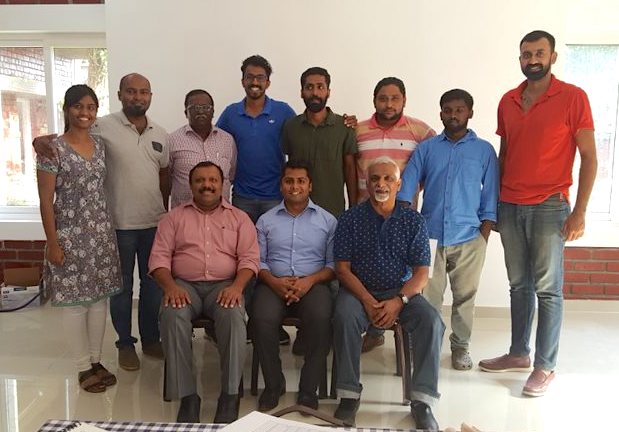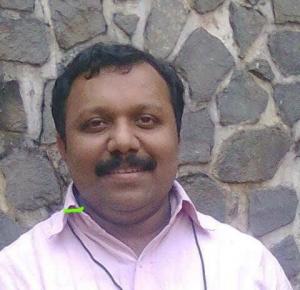Curriculum Coach Spotlight: Joseph
A Curriculum Coach is a business professional who offers their expertise within the Partners Worldwide network and leads and facilitates our business training strategy in a country or region.
There are 25 of these Coaches in 15 countries. They are wildly talented and passionate men and women, excellent trainers, experienced businesspeople, and most importantly, they have a heart to serve and to “coach” others. They don’t simply teach our curriculum; they train people to train people, through our proven Train-the-Trainer approach.
These Curriculum Coaches are the secret sauce that makes our business training successful throughout our global network.
Since these people are so extraordinary and vital to the success of the PW network, we decided to highlight them and tell their stories. Thus far, we have highlighted Carmen, Tendai, and Simon. Today, we are excited to feature our newest Curriculum Coach from India, Joseph Samuel!

Joseph has been acquainted with the Partners Worldwide's network in India since its origination almost eight years ago and was just recently on-boarded as a Curriculum Coach in early 2018.
Already, he's led two groundbreaking Train-the-Trainer events in Bangalore and Cochin, helping equip our rapidly-growing network of businesspeople in India to become trainers and spread the principles of effective, ethical, Christian business.
In addition to his work with PW, Joseph is CEO of Bibliant; a social enterprise focused on providing adequate nutrition for children in India. He is also married to Joyce, and they have two sons, Ben and Dan.
AN INTERVIEW WITH JOSEPH
 Describe your professional background and how you ended up doing what you're doing now?
Describe your professional background and how you ended up doing what you're doing now?
I am primarily a business management specialist. I have held senior-level positions at various multi-national companies and have worked in microfinance banking and healthcare organizations.
In early 2008, while working for International Bible Society, I traveled to a remote village in Bihar state, near the Nepal border, during a time of intense flooding. Although the entire district was underwater, we were able to distribute Bibles and literature to the people and provide relief.
After spending six days in that village, I knew I wanted to dedicate my entire life to serving the people in the villages of India.
Many people do not know that 60 percent of India's population are farmers, living in villages, often in extreme poverty. These farmers, even the most entrepreneurial among them, often do not know how to manage finances or plan for their businesses.
Since 2008, God has given me many opportunities to serve the villages, working in microfinance, healthcare, and management training.
Through my work, I have employed over 500 people over the years in 11 states, and I have been able to travel extensively into villages in every part of India and see the country deeply; few people have had the opportunity to see India's villages as much as I have, which I am deeply grateful for.
For the past seven years I have been living in Mumbai, and three years ago I started my own social enterprise company, Bibliant, which I am currently running.
What do you enjoy most about being a PW Curriculum Coach?
It's a wonderful opportunity to train people who have impact closest to the need, on how to run a successful business, and how plan and manage finances.
When people in poverty do not know how to properly manage their businesses or their finances, they are often taken advantage of, and exploited by systems that keep them in poverty. This is where Christians should come in, to help the exploited, and one way of doing this is to teach them how to handle their businesses and plan their finances.
By being able to invest in other trainers and job creators as a Curriculum Coach, I'm able to have an exponential impact in helping businesspeople and farmers escape the cycles of poverty. This helps fulfill my passion of serving those at the base of the pyramid, although indirectly.
Tell me more about your background in microfinance and experience working with villages in India?
In my microfinance work, I had the opportunity to develop new products and programs, overseeing the entire life of a financial product, including conditions for a loan, when loans should be written off, etc.
I was involved with agriculture loans, ag-insurance loans, and have guided several teams through this.
When I worked in Hyderabad, we experienced a huge challenge with suicides among the farmer population, because so many of them are encumbered with unpayable microfinance debt. It was such an overwhelming challenge, with these oppressive loans that keep poor people in poverty, and we worked hard to create affordable loan products that allowed the farmers to flourish, not be enslaved by a lifetime of debt.
This is an area I am very passionate about, helping set Indian farmers and micro-business owners free from unpayable debts and helping them access affordable loans, as well as the technical support services they need, such as training, mentoring, ag-insurance, market linkages, and more.
How would you describe your approach when it comes to “training trainers?”
I look at the kind of people I am training, try to understand where they are coming from, what their background is, and make sure to keep the training material relevant to them.
In a recent training, for example, some people in the group had a very good grasp of management while others had very little understanding of management. So, I had to speak to the audience in a way where all were comfortable and could cater some sections toward the more advanced group, and others toward the group with less education in business. I always ask the whole group to work on certain "homework" projects, and I base those assignments on their readiness to be trainers and successful managers.
As a trainer, I find it critical to tap into the inherent creativity and ideas of the participants and spend a good amount of time listening to them. I ask for their ideas and give them space to be creative. Instead of correcting them, I ask questions like "Did you think of this..." or "What would you do in this instance...?"
I watch how people respond, and sometimes adjust the content as needed. It's more important to form a genuine connection with the participants, especially when they are being trained as trainers, than to simply follow the content word for word.
What advice would you give to entrepreneurs who are just getting started?
Plan, plan, and plan.
This is something new entrepreneurs often lack because they trust too much in the quality of their product and are overconfident in their ability to find consistent markets. They need to go through every angle of their business—segmenting, pricing, marketing, and put things on paper.
Traditionally, Indians are asked to memorize—not put things on paper—so they don’t often plan their businesses very well on paper. I tell them, go through every aspect of your business, have a deep understanding of every aspect of it before you plunge into it.
Account for delays, expect the unexpected and make a written schedule of to-do's each day.
As an example, just acquiring one license might take eight to ten months; how are you going to meet expenses during that delay? Planning ahead is the key to keeping businesses afloat and allowing them to grow.
What are you most excited about with the future of the PW network in India? What is your dream for this work five years from now?
Helping businesspeople in India, especially Christians, to see that business is not a bad thing, but that business is a vital part of God’s will. That our network will come to embody 1 Corinthians 10:31 - "whatever you do, do it all for the glory of God."
We can be part of raising a generation who sees business as a good thing, and who understand how to do business the right way, God's way.
Ethics is a very loose term in India, and few people want to stand up for their ethical beliefs; but if we can inspire a generation of Christian business leaders to refuse to pay bribes or only see business as a "necessary evil," but instead to use business as a force for good, we can change India completely.
When we do this well, we can impact the country not just in the cities, but in the villages.
This is another thing I'm very passionate about with PW's work in India: the opportunity to unlock the potential of small-scale farmers and the rural poor, to provide not just capital and increased production for farmers, but also storage, warehousing, social capital, and market linkages.
Currently, many farmers are essentially slaves to the money lenders, who take all the harvest without paying the farmers their due wage. We can and must change this system; as Christians, we need to step up and use business as the force for good that it is meant to be.
Stay tuned for the next Curriculum Coach Spotlight!